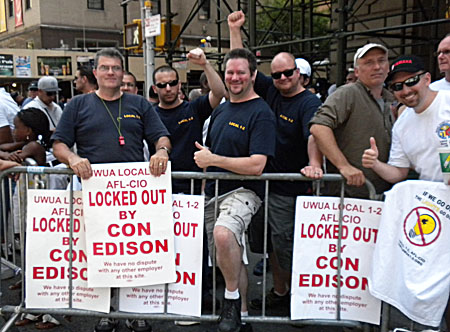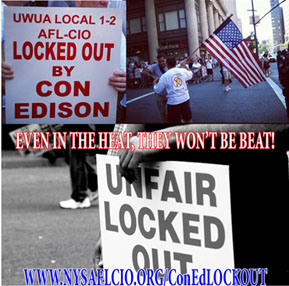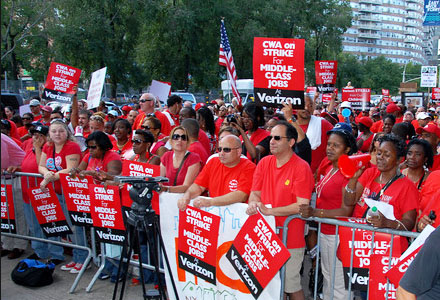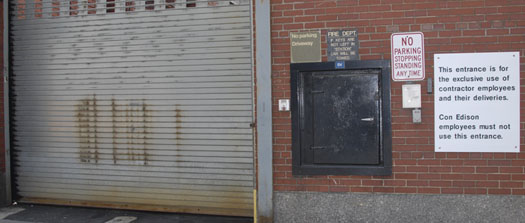Today, New York City power workers called on state regulators to order Consolidated Edison to end its lockout of the unionized workers, charging ConEd is violating regulatory obligations by its action in the labor contract negotiations.
A major sticking point in the negotiations has been Con Edison’s move to phase out defined pensions for union workers, as well as disagreement over wages and healthcare costs.
In the new offer, the company proposed to maintain the current defined benefit pension formulas for all employees hired before July 1, 2012 and apply a cash-balance, defined-benefit pension formula for employees hired after that date.
This all sounds way too familiar to Verizon workers who have been working without a contract for over a year now. Some of the Members are wondering if Verizon will follow the yellow brick road to union busting and either lock out their workers or declare an impasse. Make no mistake, I am not suggesting that this has or will occur.
Regional Bargaining Report #59
Employer/Union Rights and Obligations – NLRB
The National Labor Relations Act forbids employers from interfering with, restraining, or coercing employees in the exercise of rights relating to organizing, forming, joining or assisting a labor organization for collective bargaining purposes, or from working together to improve terms and conditions of employment, or refraining from any such activity. Similarly, labor organizations may not restrain or coerce employees in the exercise of these rights.
Examples of employer conduct that violates the law:
- Threatening employees with loss of jobs or benefits if they join or vote for a union or engage in protected concerted activity.
- Threatening to close the plant if employees select a union to represent them.
- Questioning employees about their union sympathies or activities in circumstances that tend to interfere with, restrain or coerce employees in the exercise of their rights under the Act.
- Promising benefits to employees to discourage their union support.
- Transferring, laying off, terminating, assigning employees more difficult work tasks, or otherwise punishing employees because they engaged in union or protected concerted activity.
- Transferring, laying off, terminating, assigning employees more difficult work tasks, or otherwise punishing employees because they filed unfair labor practice charges or participated in an investigation conducted by NLRB.
Examples of labor organization conduct that violates the law:
- Threats to employees that they will lose their jobs unless they support the union.
- Seeking the suspension, discharge or other punishment of an employee for not being a union member even if the employee has paid or offered to pay a lawful initiation fee and periodic fees thereafter.
- Refusing to process a grievance because an employee has criticized union officials or because an employee is not a member of the union in states where union security clauses are not permitted.
- Fining employees who have validly resigned from the union for engaging in protected concerted activities following their resignation or for crossing an unlawful picket line.
- Engaging in picket line misconduct, such as threatening, assaulting, or barring non-strikers from the employer’s premises.
- Striking over issues unrelated to employment terms and conditions or coercively enmeshing neutrals into a labor dispute.
What rules govern collective bargaining for a contract?
After employees choose a union as a bargaining representative, the employer and union are required to meet at reasonable times to bargain in good faith about wages, hours, vacation time, insurance, safety practices and other mandatory subjects. Some managerial decisions such as subcontracting, relocation, and other operational changes may not be mandatory subjects of bargaining, but the employer must bargain about the decision’s effects on unit employees.
It is an unfair labor practice for either party to refuse to bargain collectively with the other, but parties are not compelled to reach agreement or make concessions.
If after sufficient good faith efforts, no agreement can be reached, the employer may declare impasse, and then implement the last offer presented to the union. However, the union may disagree that true impasse has been reached and file a charge of an unfair labor practice for failure to bargain in good faith. The NLRB will determine whether true impasse was reached based on the history of negotiations and the understandings of both parties.
If the Agency finds that impasse was not reached, the employer will be asked to return to the bargaining table. In an extreme case, the NLRB may seek a federal court order to force the employer to bargain.
The parties’ obligations do not end when the contract expires. They must bargain in good faith for a successor contract, or for the termination of the agreement, while terms of the expired contract continue.
A party wishing to end the contract must notify the other party in writing 60 days before the expiration date, or 60 days before the proposed termination. The party must offer to meet and confer with the other party and notify the Federal Mediation and Conciliation Service [1] of the existence of a dispute if no agreement has been reached by that time.
How is “good faith” bargaining determined?
There are hundreds, perhaps thousands, of NLRB cases dealing with the issue of the duty to bargain in good faith. In determining whether a party is bargaining in good faith, the Board will look at the totality of the circumstances. The duty to bargain in good faith is an obligation to participate actively in the deliberations so as to indicate a present intention to find a basis for agreement. This implies both an open mind and a sincere desire to reach an agreement as well as a sincere effort to reach a common ground.
The additional requirement to bargain in “good faith” was incorporated to ensure that a party did not come to the bargaining table and simply go through the motions. There are objective criteria that the NLRB will review to determine if the parties are honoring their obligation to bargain in good faith, such as whether the party is willing to meet at reasonable times and intervals and whether the party is represented by someone who has the authority to make decisions at the table.
Conduct away from the bargaining table may also be relevant. For instance if an Employer were to make a unilateral change in the terms and conditions of employees employment without bargaining, that would be an indication of bad faith.
Source URL: http://www.nlrb.gov/rights-we-protect/employerunion-rights-obligations
Published on NLRB (http://www.nlrb.gov)
Everything You Were Afraid To Ask About Lockouts
By Robert M. Schwartz |April 17, 2012
Lockouts seem to be everywhere. At Cooper Tire in Ohio, sugar beet plants in North Dakota, the New York City Opera, the National Football League, and Caterpillar’s locomotive plant in Ontario, management has used the tactic to try to force outrageous concessions.
A typical scenario: An employer presents a draconian final offer. The union refuses to sign a contract with the new terms, and the employer locks the workers out until they change their minds.
But some unionists see a silver lining. If workers are going to have to take valiant measures to resist an abusive contract, triggering a lockout may put them in a better position than declaring a strike.
A lockout has four advantages over a strike: 1) workers cannot be permanently replaced, 2) they can often collect unemployment benefits, 3) the public will be more sympathetic, and 4) the possibility of getting back pay through NLRB proceedings may put decisive pressure on the employer.






